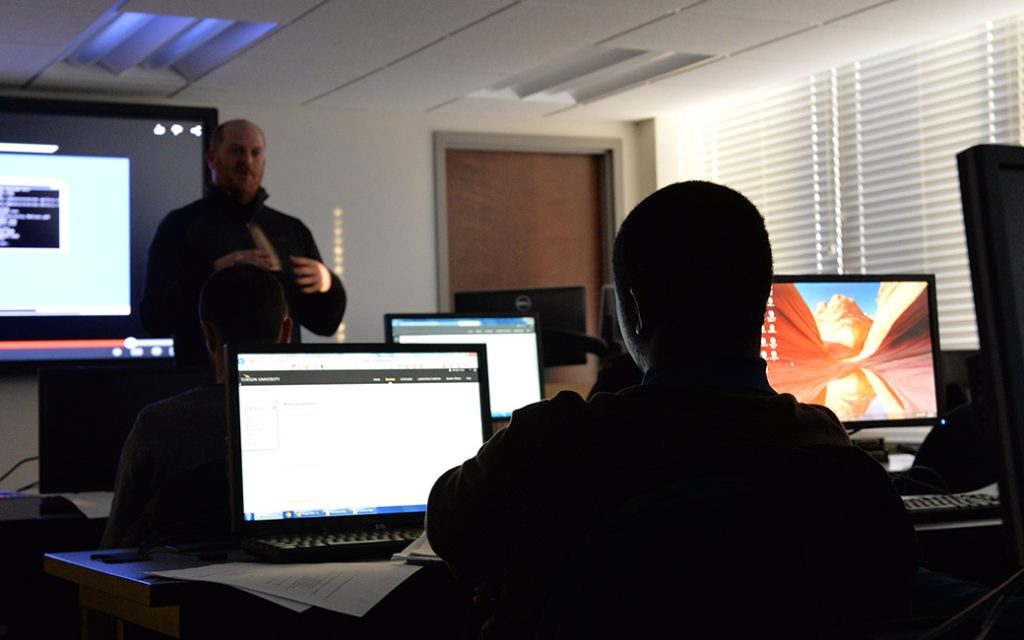Because IT specialists are among the most sought-after professionals, the Flemish employers organisations VOKA and Agoria are also looking for IT specialists outside the European Union. A first pilot project has been started with Morocco, reports De Standaard, with VOKA leader Hans Maertens confirming the story.
In the last year, there were almost 4,000 vacancies in Flanders for the position of analyst developer, with only 900 jobseekers with the skills to do the job. “The shortage on the labour market is enormous,” says Bert Mons, director of Voka West-Flanders.
That is why the employers organisations Voka and Agoria are collaborating with, among others, the Flemish Service for Employment and Vocational Training (VDAB) to bring Moroccan computer scientists to Flanders. The intention is to welcome the first ones in the second half of this year.
The first step is to determine the type of vacancies that need to be filled. The Moroccan counterpart of the VDAB, Anapec, selects the IT students who match the profiles. The Flemish companies then recruit the Moroccan IT specialists, with a contract of six months to one year. After that there is the possibility of a permanent appointment.
According to the Belgian Development Agency, Enabel, Morocco was chosen because it is a partner country with which there is already close cooperation. Moreover, the quality of the IT training courses is considered to be of a sufficiently high standard.
This is the first time that the VDAB and employers federations are structurally looking for workers outside Europe. That is why the project was kept small: the goal is to attract thirty Moroccans over a period of one and a half years. “This is a pilot project,” says Mons. “If this works well, we can scale it up quickly.”
According to VDAB, it participates in order to “gain experience with the new policy on legalising economic migration fro countries outside the European Union.” Under the impulse of Minister of Work Philippe Muyters (N-VA), the Flemish government relaxed the rules for economic migration at the beginning of this year.
According to the VDAB, "economic migration is necessary to meet the needs of the labour market.” The employment mediation service sees it as a remedy for the most structural bottlenecks.
"This is solved in this pilot project by the ‘flanking measures’ such as Dutch lessons and introductory lessons on Flemish and Belgian culture, by the Flemish Integration Agency,” says VDAB spokesman Shaireen Aftab. The selected employees can then decide for themselves whether they want to stay at work in Belgium and they can, in principle, bring their families, like other migrants who have the right of residence in Belgium.
Minister of Development Cooperation Alexander De Croo (Open VLD) believes that Belgium should have stronger control over which foreigners come to work here.
“Belgium attracts the most low-skilled migrants of all Europe,” says Tom Meulenbergs, spokesman for De Croo. “It is clear that our migration policy must become much more selective, as is the case in Canada and Australia, for example. We need to be much more self-determining about which profiles come here. This pilot project is a start.”
Labour migration is politically sensitive because massive influx of guest workers for industry and coal mines in the 1960s led to problems of integration. “The integration policy of that time has completely failed,” acknowledges Mons. “That is why a flanking policy is now planned. Employers are very aware that they cannot leave IT specialists to their fate and must also provide support after working hours.”
Moroccan workers will receive help in finding a home, but will have to pay for it themselves. “They will receive a competitive salary, which should help them find housing on the rental market.” according to Enabel.
The European Commission will cover the costs, which amount to 1.2 million euro.
Arthur Rubinstein
The Brussels Times

